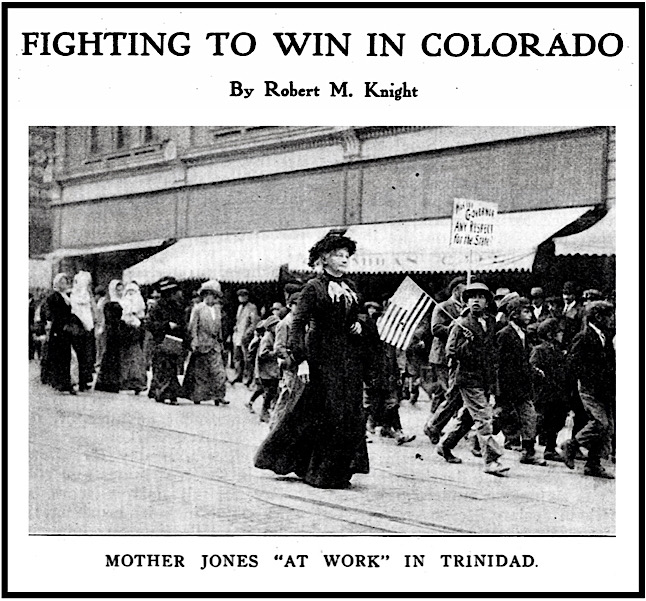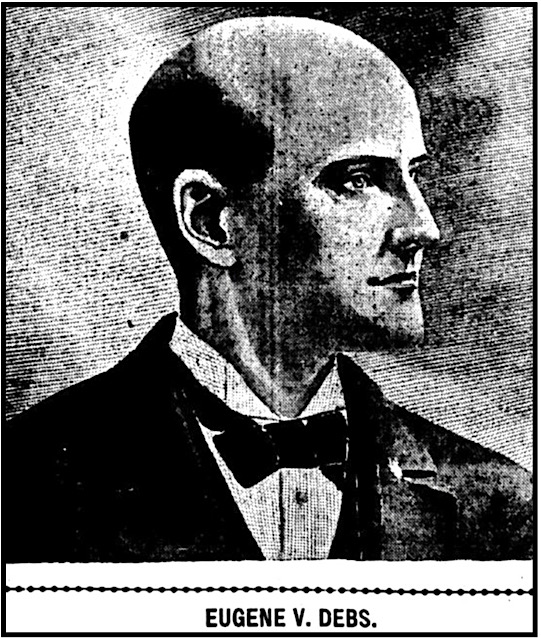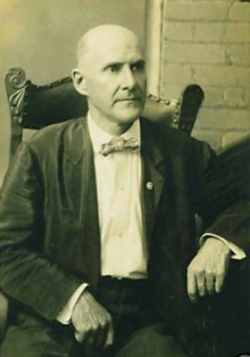 —————
—————
Hellraisers Journal – Wednesday December 3, 1913
Coal Miners of Southern Colorado Are Fighting to Win, Part I
From the International Socialist Review of December 1913:
[Part I of II]
”THE fight is on. We would have avoided it; we still stand ready at any time to meet representatives of the other side with hopes of effecting a settlement. We hold out the olive branch continually. But because we wish for peace must not be construed as a sign that we are not able to fight. Our past record should dispel such idle dreams. We will aid our brothers in the Colorado fields with all of our resources; with the advice of men of experience; with the hearty good will and sympathy of the vast army of sturdy workers that make up our membership. And these will give a good account of themselves against all the powers of darkness the operators may bring against us.”-Mine Workers Journal.
For months the leading newspapers (?) of Denver and all the capitalist sheets throughout the state, both daily and weekly have been repeating the same rigmarole in regard to the coal strike. While they insult the union men, they anxiously defend themselves against any suspicious of sympathy with the Standard Oil crowd. Their excuses are: A strike is an industrial war for more wages and not one of principle, it does not in their opinion affect the question of morality; finally, even if right and justice is on the side of the miner it is a vain attempt to subjugate by force of a strike, the peaceful relations of No. 26 Broadway [Rockefeller’s HQ in New York City]. Would not open shop conditions free the miner of all his trouble? Therefore, should not the miners welcome the open shop as a happy event instead of seeking a recognition of the union through a “bloody and ruinous strike”?
Let us look a little into the real cause of this strike that dates, back to April 1, 1910, a time when there were not over three thousand organized miners in the state. Our contract expired then and the operators knew we would never be any weaker and perhaps they never more powerful. Therefore they sought to force an open shop by refusing to recognize the miner’s right to organize and sell his labor-power collectively. A strike resulted, one that history will perhaps record as the hardest fought mile of the miner’s road to industrial freedom.
There were but few of us and after several months the busy world outside forgot all about the strike in northern Colorado. Strikes were fought and won in various parts of the country; all the while the miners stood firm, fighting injunctions, suffering jail sentences and other hardships without complaining, yet knowing all the time our only hope for victory was an organized strike in the southern part of the state, as we were unable to seriously affect the market. National organizers were sent south and at once began the task of secretly organizing the slaves in John D.’s hell-holes of Colorado. This work was slow and dangerous requiring three and one-half years’ time (and “God knows” how much cash).
When the civil war was ended in West Virginia the militant workers of the union, including Frank J. Hayes and “Mother Jones” were sent to Colorado to assist in the organization work and with their arrival things began to move apace. Hayes soon asked the operators for a conference and demanded recognition of the union in the name of 15,000 newly organized slaves. The operators ignored all invitations to arbitrate boasting they had five millions of dollars for defense. They began preparing for a strike by importing gun men and thugs from West Virginia through the Baldwin Feltz detective agency. W. H. Reno, chief detective for C. F. & I., also opened a recruiting station in the Dover Hotel, 1744 Glenarm place, and succeeded in sending out of Denver some of the most notorious characters from the red light district and barrel house bums. Upon the arrival of these criminals in the strike zone Sheriffs Gresham and Farr (appointed by the coal companies), gave them deputy sheriff commissions.
The State Federation of Labor held its annual convention at Trinidad August 18 and when the U. M. W. of A. delegates began to arrive in town late Saturday afternoon G. W. Beltcher and Walter Belk, two Baldwin-Feltz heroes, shot and instantly killed Gerald Lippiatt, a district organizer on the main street of Trinidad. A coroner’s jury, composed of “good” business men, rendered a verdict of “justifiable homicide”; District Attorney Hendricks later preferred a charge of murder against them but the courts of Colorado do not value a coal miner’s life very high and Lippiatt’s murderers were promptly released on bond because such human hyenas are needed by the operators to maintain law and order during a strike.


 —————
—————
